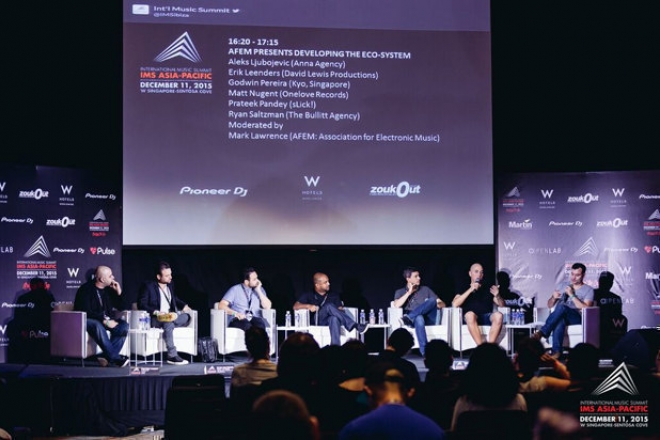Five things that talent in Asia should take away from IMS Asia-Pacific
Yo Djs, listen up

It’s a pivotal time for the dance music industry in Asia. The scene has developed so much over the last few years that electronic music is on the cusp of becoming mainstream and with a little bit of help from global players and industry leaders, hopefully it can be steered in the right direction. Last year, IMS came to Asia for the first time and held its inaugural summit in Singapore. The one-day event enjoyed immense success and so it returned this year for its second installment on December 11th at the W Hotel in Sentosa Cove and the discussions addressed essentials topics like the importance of a positive change on the issue of drugs and overcoming hurdles like heavy-handed governments. Over 300 delegates heard from people like Mark Lawrence of the Association for Electronic Music (AFEM), Armin Van Buuren, Kaskade, Sharam of Deep Dish and Richie McNeill of SFX Australia and Asia who delivered insightful and compelling keynotes and panels. The theme this year was Bridging the Gap and local DJs, promoters, movers and shakers came together on two panels called Developing the Eco-System and East Meets West and discussed the progression of the Asia-Pacific scene. One thing that everyone on these panels agreed upon was that developing local talent was paramount in building a scene and that Asia desperately needs to develop its own image away from that of Europe and North America. What Mixmag Asia took away from these talks are five things that every local DJ and producer should consider so that the industry can begin to grow around them and not just see it as a new market for international DJs to perform in.

1. Agencies ARE looking to sing Asian talent
"None of us have Asian artists. It’s not that we’re not looking for them, we just haven’t found them yet." - Erik Leenders #IMSAP
— Int'l Music Summit (@IMSibiza) December 11, 2015
When you look at any major festival line-up, an international agency’s roster, most if not all top DJ lists and even global media coverage of the dance music industry, you won’t find many Asian talents on the menu. According to Erik Leenders, who is CFO of David Lewis Productions, agencies like his are fully aware of this. Talent in Asia isn’t being ignored, it’s just an intimidating market to tap into. With a population of over four billion in all of Asia who have limited English abilities, it’s just not a straightforward venture. Like where does one even start looking?
2. Learn how to market yourself
"Now, unfortunately, the music doesn’t speak for itself anymore. The communication around the music takes over." @dj_tennis #IMSAP
— Int'l Music Summit (@IMSibiza) December 11, 2015
It’s a sad truth but talent alone isn’t enough anymore. And it’s even harder for talent in Asia to get recognized outside of the region simply due to proximity but there are other variables too. For one it’s hard to stand out simply because of the sheer volume of people here, also overcoming language barriers is frustrating and often impossible, and then there are those whose mentality is so damn far underground that it’s not cool to promote yourself. Well guess what, your favorite techno DJs weren’t born wearing black, they had to try too. Find creative ways to market yourself and make yourself easily approachable to a global audience, and if you can’t do it alone, find help. Make a press kit. Develop a brand. Start a label. Opportunities await you.

3. Focus on building a community instead of yourself
"Creating a scene is about creating a community. It has to bond organically." - @dj_tennis on Asia's need to grow its local industry. #IMSAP
— Int'l Music Summit (@IMSibiza) December 11, 2015
It’s like every man for himself in Asia. Especially in the smaller scenes, people are working against each other rather than together and the result are a bunch of fragmented and cliquey circles. Instead of worrying so much about developing your own profile, worry more about creating a culture. Europe has techno, America has EDM, but what is the sound that defines Asia? Godwin Pereira from club kyō in Singapore and Matt Nugent from Onelove Records in Australia had the same feelings about the lack of communal growth in Asia as a whole.
"House or techno, it’s an international sound. How do you really define an “Asian sound”?" - Godwin Pereira on a local sound at #IMSAP.
— Int'l Music Summit (@IMSibiza) December 11, 2015
"You really do have to develop your own sound in order to breakthrough somewhere else." - @Mattnugentoz on breaking local talent. #IMSAP
— Int'l Music Summit (@IMSibiza) December 11, 2015
4. Educate your audience instead of catering to it
Ladies and gentlemen that’s how we can make the EDM bubble burst, especially in Asia where clubs thrive on importing and pushing whatever is popular in the West. But it’s hard to blame an audience for consuming what they’re fed when they barely have access to any alternatives so it’s up to DJs to use their position and their influence, take risks and slowly educate their audience.
"The crowd is so focused on the Top 100. If you’re not in the Top 100, they don’t want you. So it’s about education." - Erik Leenders #IMSAP
— Int'l Music Summit (@IMSibiza) December 11, 2015
"There’s only so many international acts you can book. Then you look at local talent. They’re the ones educating." - @prateekpandey #IMSAP
— Int'l Music Summit (@IMSibiza) December 11, 2015
And in a scene oversaturated with epilepsy inducing drops, Deep Dish’s Sharam has spoken insightful words to live by. Like it’s not necessary to feed your crowd drops every 3.5 seconds, let their heart rate slow down a bit. It’s all good.
"People shouldn’t be allergic to the fact that people’s hands aren’t in the air the entire time. It’s a journey." @DJSHARAM #IMSAsiaPacific
— Int'l Music Summit (@IMSibiza) December 11, 2015
5. Meet new people, network & collaborate
"As a label, we live in a great time where we can promote online, but it’s about partnering with strategic people." - Matt Nugent at #IMSAP
— Int'l Music Summit (@IMSibiza) December 11, 2015
Whether it’s within your city, country or even neighboring nations, meet people in your industry and see what you can do together. Asia has this whole other world of local pop stars that have amassed fans that number in the millions and a collaboration with a local artist like that would reach an entire new market. Look at how Skrillex and Diplo reached out (unbelievably at first) to Bieber but when Where Are Ü Now came out, the collaboration suddenly made perfect sense and their names became buzz words in each other’s markets. The premise of IMS and all music conferences is to network, but networking should happening at every level to for a healthy scene.

And to wrap things up, words from Ryan Saltzman from The Bullitt Agency on the importance of perseverance.
"There’s no one formula to making it in this industry. The only thing is to never give up." - @ryanbullitt's closing statement. #IMSAP
— Int'l Music Summit (@IMSibiza) December 11, 2015


